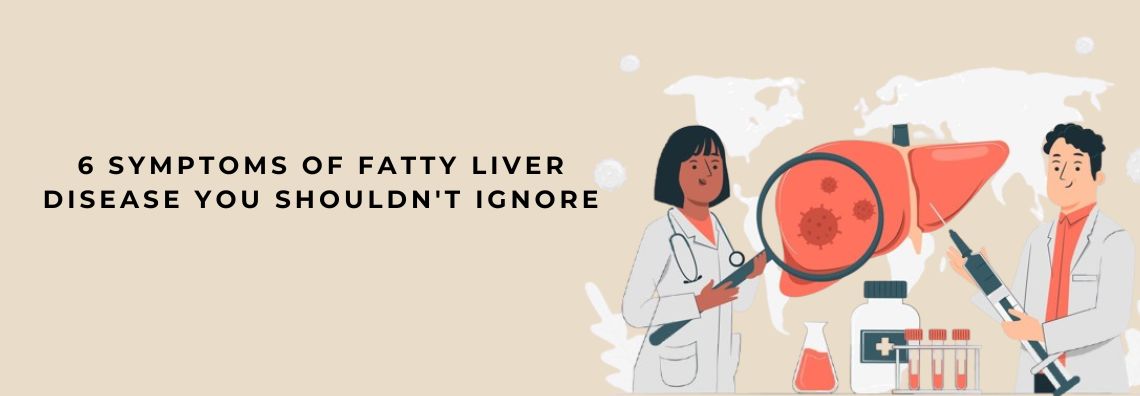
What is fatty liver disease?
Fatty liver disease is basically a condition in which excess fat builds up in the liver, leading to inflammation. It is a very common but often overlooked health condition and affects millions of people globally every year. In some cases, it even leads to serious complications like liver fibrosis, cirrhosis or even liver failure. Liver impairment leads to widespread affects on a person’s health as it plays a crucial role in detoxification and metabolism.
The worst part about this condition is that in its early stages, it shows very subtitle signs that are mostly unrecognizable. However, as a disease progresses and causes more damage to the liver a person’s body finally starts to show clear signs that something is wrong with the body.
Recognising the symptoms as early as possible and getting the required diagnosis and treatment can help in preventing irreversible damage to the liver. So……
Six Symptoms of Fatty Liver Disease You Should Not Ignore
Persistent Fatigue and Weakness
A human liver plays a crucial role in detoxifying the blood, producing proteins and regulating energy levels. So, in the condition where it gets overloaded with fat, its efficiency declines. This reduced working capacity of the liver causes a feeling of tiredness, sluggishness, weakness and exhaustion despite taking proper sleep, diet and rest.
Unexplained Weight Loss or Loss of Appetite
A damaged liver struggles with properly metabolizing nutrients. This leads to decreased appetite suddenly or reduced hunger in a person, ultimately leading to sudden weight loss. This can be a red flag for liver dysfunction.
Abdominal Discomfort or Pain
A mild but persistent pain in the upper right side of the abdomen, where the liver is located, is another major sign of something wrong with the liver and indicates inflammation or swelling of the liver.
Jaundice (Yellowing of Skin and Eyes)
Jaundice is one of the other conditions that occur in a person due to liver dysfunction which occurs due to building up of bilirubin in blood. Bilirubin is a yellow substance that is created when red blood cells break down. It is processed by the liver to be mixed up with bile and thus gets utilized. An improper functioning of the liver leads to bilirubin accumulation in the blood. The major symptoms of jaundice are yellowing of skin and the whites of the eyes, dark coloured urine, pale stools, etc.
Swelling in the Abdomen or Legs (Edema and Ascites)
The liver loses its ability to regulate proteins and fluids effectively at fatty liver conditions. This leads to fluid retention in the body especially in the legs known as edema and causes swelling and also causes bloated abdomen known as ascites.
Mental Confusion or Brain Fog
If a person is persistently facing cognitive issues like confusion, poor concentration, forgetfulness, etc., that may be the sign of compromised liver function. It is because the liver helps to filter out toxins from the blood and if this ability of the liver is disturbed, these toxins can accumulate in the blood and affect brain function. This condition is known as Hepatic Encephalopathy.
How to Prevent and Manage a Fatty Liver Disease
Maintaining a Healthy Diet
A healthy and well balanced diet helps with improving most of the health issues including fatty liver condition. Try to add whole foods like fruits, vegetables, lean proteins, healthy fats, etc., in your diet. Also, try to avoid excessive sugar, refined carbohydrate and processed foods as much as possible.
Regular Exercise and Weight Management
Try to engage in physical activity and moderate exercise routine at least 5 days a week to improve your health and reduce liver fat. This will also help with management and losing even a small percentage of your body weight can significantly improve your health.
Limiting Alcohol Consumption
Alcohol can worsen fatty liver disease, so it is best to minimise or eliminate alcohol intake.
Monitoring Blood Sugar and Cholesterol Levels
Managing conditions like diabetes, high cholesterol and high blood pressure can reduce the risk of liver disease
When to See a Doctor?
If you are experiencing any of the symptoms mentioned above, it’s crucial to seek medical advice. A doctor can perform a blood test, imaging studies and liver function tests to determine the severity of the condition and recommend appropriate treatment.